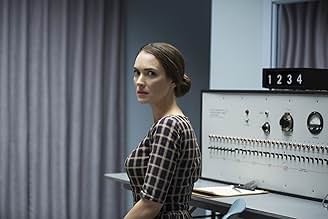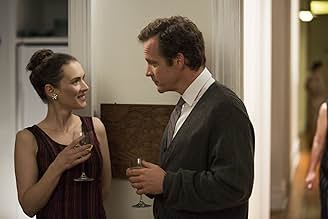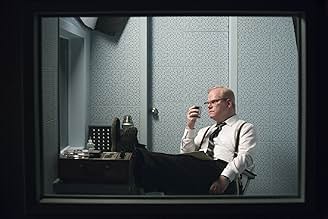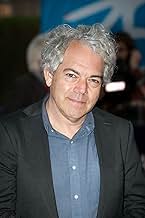IMDb RATING
6.6/10
21K
YOUR RATING
In 1961, famed social psychologist Stanley Milgram conducted a series of radical behavior experiments that tested ordinary humans' willingness to obey authority.In 1961, famed social psychologist Stanley Milgram conducted a series of radical behavior experiments that tested ordinary humans' willingness to obey authority.In 1961, famed social psychologist Stanley Milgram conducted a series of radical behavior experiments that tested ordinary humans' willingness to obey authority.
- Awards
- 3 wins & 6 nominations total
Ned Eisenberg
- Solomon Asch
- (as Ned Eisenburg)
- Director
- Writer
- All cast & crew
- Production, box office & more at IMDbPro
Featured reviews
This film is particularly surprising. It's very interested in many of the facts of the real life obedience experiment. In fact, one could even argue that it seems to be very dry and non- climactic. The docudrama, of course, is restrained and doesn't overdo anything with large dramatizations of events and beats. I can also very much see many people getting bored with it however. Saarsgard is really great, totally inhabiting and creating that version of Milgram. Glad to see Winona Ryder on the screen again. Overall, it is very subdued, but it is a great introduction to the experiment that really shows as much as we can learn about what motivates people to commit such crimes.
For some reason I expected more of a documentary, so this docudrama nearly had me out the door, but the authoritative man in the grey lab coat persuaded me to stay.
It clearly, and to my understanding, accurately, lays out the format of the notorious Milgram Experiment, which is necessary for all that follows; the public and academic backlash, our involvement as we question whether we would behave like Milgram's subjects, and his own soul-searching. To be sure, he comes across as quite cold-hearted, and more self-doubt would have made a more interesting story. Instead, all of the doubt is carried by his colleagues and Wynona Ryder as his patient wife.
The original experiment is well-enough represented that the re-creation of a TV series about it (with Kellan Lutz as a young William Shatner playing the Milgram character) has some amusingly obvious elements of parody, and hence self-parody of this film.
The film has some unsettling features over and above the experiments themselves - scenes carried out in colour in front of poorly placed monochrome back-projections, and an elephant, yes, a real, if slightly out of focus elephant behind Peter Sarsgaard as he talks to the camera walking towards us along a university corridor. Why? If it's The Elephant In The Room, what are we not seeing?
As Milgram points out, he and his experiment are treated with opprobrium, but the results are accepted, and serve their purpose. While the Holocaust is repeatedly invoked (including footage of the Eichmann trial), and Milgram twice mentions that his name is Hebrew for pomegranate (in fact it's not but milgrom is the Yiddish), an obvious ethical parallel is not mentioned: the Nazi experiments of killing prisoners with X-rays, which are still shown (usually on an opt-in basis) to medical students.
It clearly, and to my understanding, accurately, lays out the format of the notorious Milgram Experiment, which is necessary for all that follows; the public and academic backlash, our involvement as we question whether we would behave like Milgram's subjects, and his own soul-searching. To be sure, he comes across as quite cold-hearted, and more self-doubt would have made a more interesting story. Instead, all of the doubt is carried by his colleagues and Wynona Ryder as his patient wife.
The original experiment is well-enough represented that the re-creation of a TV series about it (with Kellan Lutz as a young William Shatner playing the Milgram character) has some amusingly obvious elements of parody, and hence self-parody of this film.
The film has some unsettling features over and above the experiments themselves - scenes carried out in colour in front of poorly placed monochrome back-projections, and an elephant, yes, a real, if slightly out of focus elephant behind Peter Sarsgaard as he talks to the camera walking towards us along a university corridor. Why? If it's The Elephant In The Room, what are we not seeing?
As Milgram points out, he and his experiment are treated with opprobrium, but the results are accepted, and serve their purpose. While the Holocaust is repeatedly invoked (including footage of the Eichmann trial), and Milgram twice mentions that his name is Hebrew for pomegranate (in fact it's not but milgrom is the Yiddish), an obvious ethical parallel is not mentioned: the Nazi experiments of killing prisoners with X-rays, which are still shown (usually on an opt-in basis) to medical students.
I have heard about this experiment many times over the years...I even heard about it a few days ago on a podcast before seeing this movie. The movie goes through all of the work of Stanley Milgram along with all of his ups and downs in his career. This was an interesting movie and I liked how Peter Scarsgaard narrated as he went along. It was good to see Winona Ryder again. The acting was very good and it was interesting to see the backstory that went along with all of these experiments that we've heard about in school and elsewhere.
You do need some patience to get through the movie - psychological experiments can be tedious on film and in real life.
This movie gave a great insight into human nature and so did the experiments. Yes it was a tad slow but it only felt like that to me after I had watched it. I was immediately drawn in by the whole setup of the experiment and with the progression of the rest of them. This won't get anyone's heart pumping or racing but nonetheless I was glued to the screen with what this movie was trying to show me. I was so fascinated by the whole idea of it, that putting up with any of the 'slow' parts seemed quite easy. If you're in any way interested in human nature and how or why people could bring themselves to do certain things, you'll definitely appreciate this film.
I didn't know anything about this man or his experiments but I always wondered about the very same things he did in regards to the tragedy's he spoke of and others. How can people slaughter others or commit heinous acts, bring themselves to do these things and then simply claim they were only the messenger? I believe it's definitely worth a watch to anyone.
I didn't know anything about this man or his experiments but I always wondered about the very same things he did in regards to the tragedy's he spoke of and others. How can people slaughter others or commit heinous acts, bring themselves to do these things and then simply claim they were only the messenger? I believe it's definitely worth a watch to anyone.
This movie is about Stanley Milgram, arguably one of the most important social psychologists in our field, and specifically about one of his most important experiment - his obedience to authority experiment.
The movie depicts to my knowledge accurately the setup, conduction, and results of the experiment and goes further, crafting an interesting and weighted portrayal of the man that Stanley Milgram was. The acting is low key, Peter Sarsgaard especially delivers a down to earth performance which shows that he rigorously prepared for the role. All supporting characters (e.g. Winona Ryder, Anton Yelchin) do a good job and no one distracts from the key issues raised by the experiment.
Cinematography is good, although nothing special. Occasionally there are creative moments in direction. When the 4rth wall is broken by Sarsgaard and he speaks directly to the audience, weird things happen in the background, making these moments very endearing and interesting.
There are no thrills or action in this movie, as well as no conventional drama. It is kind of a biopic with a twist, although I would say the biographic aspect is downplayed by the focus on this specific experiment. Many scientific issues are addressed on a side note (e.g. the ethical code of doing experiments, which triggered the proliferation of ethical committees for scientific research).
I would recommend this movie to people who are interested in science, more specifically in psychology (but not exclusively), that do not need action, drama, or thrills and enjoy a well researched and crafted movie with good acting.
The movie depicts to my knowledge accurately the setup, conduction, and results of the experiment and goes further, crafting an interesting and weighted portrayal of the man that Stanley Milgram was. The acting is low key, Peter Sarsgaard especially delivers a down to earth performance which shows that he rigorously prepared for the role. All supporting characters (e.g. Winona Ryder, Anton Yelchin) do a good job and no one distracts from the key issues raised by the experiment.
Cinematography is good, although nothing special. Occasionally there are creative moments in direction. When the 4rth wall is broken by Sarsgaard and he speaks directly to the audience, weird things happen in the background, making these moments very endearing and interesting.
There are no thrills or action in this movie, as well as no conventional drama. It is kind of a biopic with a twist, although I would say the biographic aspect is downplayed by the focus on this specific experiment. Many scientific issues are addressed on a side note (e.g. the ethical code of doing experiments, which triggered the proliferation of ethical committees for scientific research).
I would recommend this movie to people who are interested in science, more specifically in psychology (but not exclusively), that do not need action, drama, or thrills and enjoy a well researched and crafted movie with good acting.
Did you know
- TriviaThe real William Shatner did in fact portray Stanley Milgram in The Tenth Level (1976) which was filmed several years after Star Trek (1966) ended.
- GoofsStanley Milgram in the film states the origin of his last name is Hebrew for pomegranate. "Milgram," however, derives from the Yiddish word for pomegranate, not Hebrew.
- Quotes
Stanley Milgram: I believe we are puppets with perception, with awareness. Sometimes we can see the strings. And perhaps our awareness is the first step in our liberation.
- Crazy creditsA cast credit: "Elephant in the Room: Minnie"
- ConnectionsFeatures Candid Camera (1960)
- SoundtracksSome Enchanted Evening
Written by Richard Rodgers & Oscar Hammerstein II
Performed by Mantovani Orchestra and Chorus (as Mantovani Orchestra)
Courtesy of Drew's Entertainment
- How long is Experimenter?Powered by Alexa
Details
- Release date
- Country of origin
- Official sites
- Language
- Also known as
- El experimento de Milgram
- Filming locations
- New York City, New York, USA(location)
- Production companies
- See more company credits at IMDbPro
Box office
- Budget
- $1,700,000 (estimated)
- Gross US & Canada
- $155,575
- Opening weekend US & Canada
- $8,682
- Oct 18, 2015
- Gross worldwide
- $224,145
- Runtime
- 1h 38m(98 min)
- Color
- Aspect ratio
- 1.78 : 1
Contribute to this page
Suggest an edit or add missing content













































